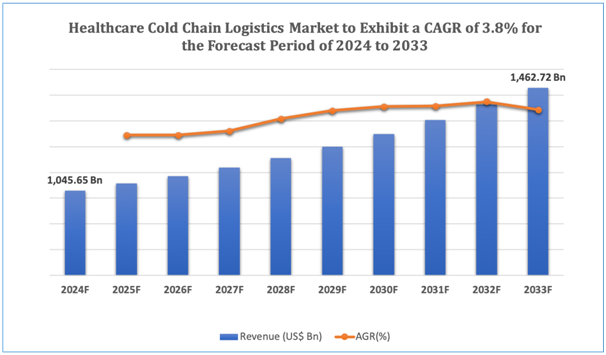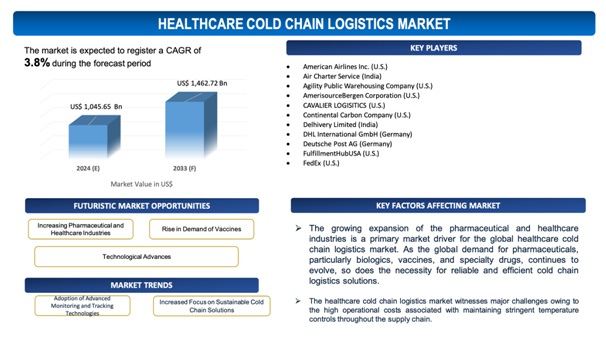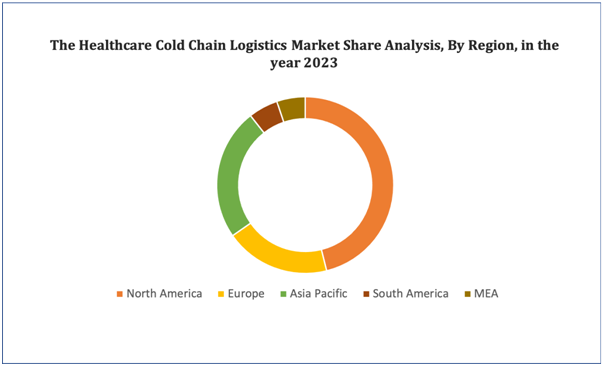Healthcare Cold Chain LogisticsMarket Overview
The global Healthcare Cold Chain Logisticsmarket is estimated to be worth over USD 1,462.72Bn in 2033 and is expected to grow at CAGR of3.8% during the forecast period (2024-2033).
Healthcare cold chain logistics is transforming the pharmaceutical outlook by ensuring the effective and safe transportation, storage, and distribution of temperature-sensitive medical products. This specialized logistics sector is crucial for maintaining the integrity and potency of an extensive scale of pharmaceuticals, comprisingbiologics,vaccines, blood products, and various types of medications that need strict temperature control to remain effective. The implementation of strong cold chain solutions is essential in preventing product degradation, which can result inminimized efficacy or even harmful consequences for patients.
One of the major ways healthcare cold chain logistics is revolutionizing the pharma panorama is through developments in technology. Advancements such as real-time temperature monitoring, specialized packaging materials, and sophisticated tracking systems are improving the efficiency and reliability of cold chain processes. These technologies allow continuous monitoring and immediate alerts if temperatures deviate from the required range, ensuring that any potential issues can be addressed promptly to safeguard the product's integrity.
Additionally, the soaring complexity and global nature of the pharmaceutical supply chain demand highly coordinated logistics solutions. Cold chain logistics providers are leveraging data analytics and IoT (Internet of Things) devices to optimize routes, minimize transit times, and reduce the risk of temperature excursions. This level of precision and control is especiallycritical for the global distribution of COVID-19 vaccines, which need ultra-low temperature storage and have stringent distribution requirements.
Moreover, regulatory compliance is a significant driver in the development of healthcare cold chain logistics. Stringent regulations by health authorities like the FDA and WHO necessitate rigorous standards for the handling and transportation of temperature-sensitive pharmaceuticals. Compliance with these regulations ensures that pharmaceutical companies can deliver effective and safe products to patients globally.
Overall, healthcare cold chain logistics is revolutionizing the pharmaceutical industry by improving the safety, efficacy, and reliability of temperature-sensitive medical products. Through technological innovations, optimized logistics strategies, and stringent regulatory compliance, this sector is essential in maintaining the quality and integrity of vital pharmaceuticals throughout the supply chain.
Figure 1. Healthcare Cold Chain Logistics: Market Size

Get more details on this report - Request Free Sample
Key Market Insights
The global healthcare cold chain logistics market is experiencingstrong growth, driven by the growing demand for temperature-sensitive pharmaceuticals and the necessity for effective distribution solutions. Latest market insights reveal that the surge in biologics, vaccines, and specialty drugs, which need stringent temperature control, is a major growth driver. The COVID-19 pandemic has further underscored the crucial prominence of cold chain logistics in ensuring the safe distribution of vaccines, encouraging investments and innovations in this sector.
The current market outlook is marked by substantial advancements in technology and infrastructure. Real-time temperature monitoring systems, IoT-enabled sensors, and GPS tracking are becoming standard, enabling for continuous monitoring and immediate response to any temperature deviations. These technologies ensure that the integrity of temperature-sensitive products is maintained throughout the supply chain, from manufacturing to end-use.
Furthermore, the development of advanced packaging solutions, such as phase change materials (PCMs) and vacuum insulated panels (VIPs), is improving the efficiency and reliability of cold chain logistics. These packaging innovations offer better temperature control and longer duration of thermal protection, minimizing the risk of product spoilage.
The market is also witnessing increased regulatory scrutiny, with stringent guidelines from health authorities like the FDA and WHO driving the adoption of higher standards in cold chain management. Compliance with these regulations ensures the safe and effective distribution of pharmaceuticals, contributing to market growth.
Alongside, the expansion of cold chain logistics into emerging markets is creating new opportunities. As healthcare infrastructure enhances in regions such as Asia-Pacific, Latin America, and Africa, the demand for reliable cold chain solutions is rising, driving market expansion.
Therefore, the global healthcare cold chain logistics market is evolving at a swift pace with technological advancements, regulatory compliance, and expanding infrastructure, ensuring the safe and efficient distribution of temperature-sensitive pharmaceuticals across the globe.
Market Dynamics
Market Drivers
Increasing Pharmaceutical and Healthcare Industries
The growing expansion of the pharmaceutical and healthcare industries is a primary market driver for the global healthcare cold chain logistics market. As the global demand for pharmaceuticals, particularly biologics, vaccines, and specialty drugs, continues to evolve, so does the necessity for reliable and efficient cold chain logistics solutions. These products often need strict temperature control to maintain their safety and efficacy from the point of manufacture to the point of administration. The surge in chronic diseases, geriatric population, and the continuous development of new therapies and personalized medicines are accelerating the production and distribution of temperature-sensitive pharmaceuticals.
In addition to that, the globalization of pharmaceutical supply chains has escalated the intricacy of logistics operations. Pharmaceuticals are now manufactured and distributed across numerous regions, requiring robust cold chain solutions to ensure that temperature-sensitive products remain within the required temperature ranges during transit. This global expansion is fuelling investments in advanced cold chain infrastructure, such as temperature-controlled transport vehicles,refrigerated warehouses, and sophisticated monitoring systems.
The evolution of the healthcare sector, especially in emerging markets, is also contributing to this trend. Enhanced healthcare infrastructure and surging healthcare spending in regions like Asia-Pacific, Latin America, and Africa are creating new opportunities for cold chain logistics providers. As these markets develop, the demand for high-quality pharmaceuticals and vaccines rises, requiring reliable cold chain logistics to ensure safe and effective delivery.
Therefore, the expansion of the pharmaceutical and healthcare industries is boosting the global healthcare cold chain logistics market by spurring the demand for temperature-sensitive products and necessitating advanced, reliable logistics solutions to promote their safe distribution across a global supply chain.
Market Restraints
With regard to numerous advantages of Healthcare Cold Chain Logistics, the market faces several challenges due to the unique characteristics and requirements associated with these potent pharmaceutical products. Some of the key market challenges include:
- High Operational Costs: The healthcare cold chain logistics market witnessesmajor challenges owing to the high operational costs associated with maintaining stringent temperature controls throughout the supply chain. These costs comprise the investment in specialized refrigerated storage and transport equipment, advanced monitoring and tracking technologies, and energy expenses. In addition, the cost of compliance with stringent regulatory standards further adds to the financial burden. For many smaller logistics providers and companies in emerging markets, these increased costs can be prohibitive, deterring their capability to enter or expand within the market.
- Complex Regulatory Compliance: The global healthcare cold chain logistics market is subject to stringent and varying regulatory requirements across various regions. Ensuring compliance with international, national, and local regulations concerning the handling, storage, and transportation of temperature-sensitive pharmaceuticals can be complicated and time-consuming. Navigating these regulatory landscapes requires significant resources and expertise, and non-compliance can lead to severe penalties, product recalls, and damage to reputation. This regulatory complexity poses a barrier to market entry and can hinder the scalability and operational efficiency of logistics providers.

Get more details on this report - Request Free Sample
Market Opportunity
Rise In Demand For Vaccines
The surge in demand for vaccines stands as a major market opportunity for the global healthcare cold chain logistics market. Vaccines are highly temperature-sensitive products that need precise temperature control throughout the supply chain to maintain their safetyand efficacy. The global push for widespread immunization against various diseases, including HPV, seasonal influenza, and most notably, COVID-19, has intensified the necessity for robust cold chain logistics solutions. The COVID-19 pandemic, in particular, underlined the crucial role of cold chain logistics in ensuring the safe distribution of billions of vaccine doses globally, fuelling substantial investments and advancements in this sector.
The continuous efforts to battle emerging infectious diseases and enhance global public health through vaccination campaigns have further escalated the demand for reliable cold chain infrastructure. Governments and healthcare organizations are prioritizing the establishment of resilient cold chain systems to facilitate these large-scale immunization programs. This has created opportunities for logistics providers to expand their services, invest in advanced technologies such as real-time temperature monitoring, and develop advanced packaging solutions that ensure temperature stability.
In addition, the soar in vaccine demand is not confined to pandemic responses but extends to routine immunization programs and the advent of new vaccines. As pharmaceutical companies continue to innovate and develop vaccines for different diseases, the necessity for efficient and scalable cold chain logistics solutions will only grow. This sustained demand is driving market growth and encouraging the development of more sophisticated, reliable, and cost-effective cold chain logistics capabilities.
Thus, the growing demand for vaccines represents a major market opportunity for the healthcare cold chain logistics sector, accelerating advancements in technology and infrastructure to ensure the safe and efficient distribution of these critical medical products across the world.
Bottom of Form
Market Trends
- Adoption of Advanced Monitoring and Tracking Technologies: There is a soaring trend towards the incorporation of advanced monitoring and tracking technologies within healthcare cold chain logistics. Solutions such as IoT-enabled sensors, real-time temperature monitoring systems, and GPS tracking devices are becoming standard practice. These technologies enable for continuous monitoring of temperature conditions throughout the entire logistics process, providing instant alerts in case of deviations. This ensures that any potential issues can be addressed swiftly, minimizing the risk of product spoilage and ensuring compliance with regulatory standards. The capability to offer real-time data and analytics also enhances transparency and efficiency, enabling logistics providers to optimize routes, manage inventory more effectively, and improve overall supply chain management.
- Increased Focus on Sustainable Cold Chain Solutions: Sustainability is becoming a major focus in the healthcare cold chain logistics market. There is a growing demand for environment-friendly and energy-efficient solutions to reduce the environmental impact of cold chain operations. Advancements such as solar-powered refrigeration units, biodegradable packaging materials, and energy-efficient transport vehicles are being developed and adopted. Moreover, companies are implementing strategies to minimize waste and improve resource utilization, such as optimizing load capacities and reducing the use of single-use plastics. This trend is fuelled by growing environmental awareness and regulatory pressures, as well as the need to minimize operational costs related to energy consumption. The move towards sustainable practices not only addresses environmental concerns but also enhances the reputation and competitiveness of logistics providers in the global market.
Healthcare Cold Chain Logistics Market: Key Segments
By Type
- Biopharmaceuticals
- Vaccines
- Clinical Trial Materials
- Others
By Services
- Storage
- Transportation
- Packaging
- Others
By Storage Techniques
- Electrical Refrigeration
- Dry Ice
- Gel Packs
- Liquid Nitrogen
- Others
By Key Geographical Regions
- North America
- Europe
- Asia-Pacific
- Middle East and Africa
- South America
Figure 4. Healthcare Cold Chain Logistics Market: Distribution by Region

Get more details on this report - Request Free Sample
Healthcare Cold Chain Logistics Market: Regional Analysis
North America dominates the healthcare cold chain logistics market attributing tothe well-developed healthcare infrastructure and an increase in diseases necessitating healthcare products with proper storage and transportation.
Asia-Pacific is expected to grow at the highest growth rate in the forecast period of 2023 to 2033 owing to developing healthcare.
Leading Healthcare Cold Chain Logistics Developers
Industry Trends and Global Forecasts, 2023-2035 report features an extensive study of the current market landscape, market size and future opportunities associated with the Healthcare Cold Chain Logisticsmarket, during the given forecast period. Further, the market report highlights the efforts of several stakeholders engaged in this rapidly emerging segment of the biopharmaceutical industry. Key takeaways of the Healthcare Cold Chain Logisticsmarket are briefly discussed below.
The report includes the list of players operating in the global Healthcare Cold Chain Logisticsmarket. Some of the key players include:
- American Airlines Inc. (U.S.)
- Air Charter Service (India)
- Agility Public Warehousing Company (U.S.)
- AmerisourceBergen Corporation (U.S.)
- CAVALIER LOGISITICS (U.S.)
- Continental Carbon Company (U.S.)
- Delhivery Limited (India)
- DHL International GmbH (Germany)
- Deutsche Post AG (Germany)
- FulfillmentHubUSA (U.S.)
- FedEx (U.S.)
- Kuehne+Nagel (Germany)
- LifeConEx (U.S.)
- Prompt Brazil Logistics (Brazil)
- V-Xpress (India)
- VersaCold Logistics Services (Canada)
- YUSEN LOGISTICS CO., LTD. (India)
Healthcare Cold Chain Logistics Market: Key Developments
- In February 2024, FedEx Express, a subsidiary of FedEx Corp., and one of the world’s largest express transportation companies, has unveiled its ‘FedEx Life Science Center in Mumbai, setting a benchmark in the clinical trial supply chain in India and globally.The new capability will meet and support the clinical trial storage and logistics requirements of healthcare customers both within the India market and those shipping to India from around the world. The facility has ensured compliance with quality and regulatory requirements of the healthcare industry.
Scope of the Report
The market report presents an in-depth analysis of the various firms / organizations that are engaged in this market, across different segments, as defined in the below table:
|
|
Key Report Attributes |
Details |
||
|
|
Base Year |
2023 |
||
|
|
Forecast Period |
2024-2033 |
||
|
|
CAGR (2024-2033) |
3.8% |
||
|
|
Type |
|
||
|
|
Services |
|
||
|
|
Storage Techniques |
|
||
|
|
Key Geographical Regions |
|
||
|
Key Companies Profiled |
|
|
||
